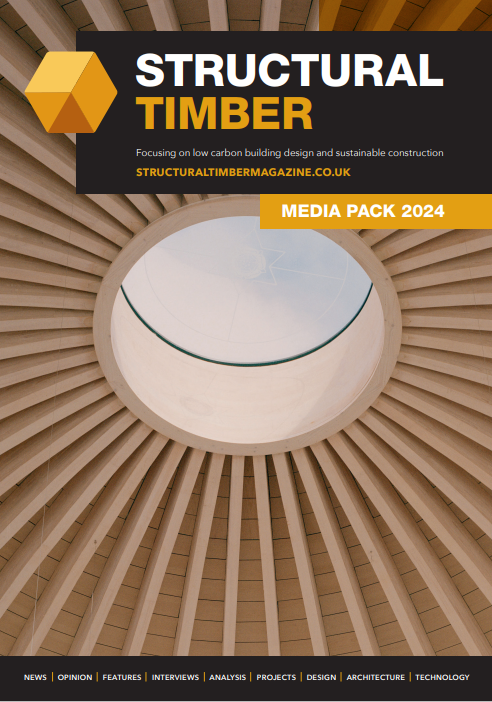CHANGING THE PATTERN OF TIMBER EDUCATION
The New Model Institute for Technology and Engineering (NMITE) and its Centre For Advanced Timber Technology (CATT) is set to be a timber technology disrupter. Founding Director, Professor Robert Hairstans outlines what it hopes to achieve.
NMITE is a start-up Higher Education Institute based in Hereford that is responding to some of the key challenges of higher education today – taking the best practice and innovations from around the world and combining them into an authentic, integrated and challenge-based approach that addresses needs of both students and employers.
Timber engineering was identified by NMITE as something that aligns directly with the ethos of the organisation. A sustainable material that can respond to the varying needs of the construction sector from restoration, retrofit to newbuild infrastructure solutions with a vast array of products and systems available. However, timber continues to face barriers to uptake as a result of misinformation and lack of available skills. Further to this, digital transformation is unlocking the potential of these products and is also considered a game changer in the construction sector. With timber, the opportunity is a digital thread from built assets back to the forest floor implementing a virtual factory environment capable of improving overall productivity, maximising resource utilisation, unlocking investment and creating sustainable growth.
Providing learners with access to the trifecta of timber, factory and digital based approaches via industry collaboration locally and nationally, creates the enabling conditions for something that can create scalable change. Further to this NMITE is situated in the West Midlands and close to the border of Wales, an area vibrant in low carbon construction and advanced timber technologies.
In addition to CATT, NMITE will also host the Centre for Automated Manufacturing (CAM) and Centre for Future Skills (CFS). CATT and CAM will be co-located at Skylon Park with a City Centre Campus offering an MEng in Integrated Engineering. This offers another unique opportunity, the symbiosis of automated manufacturing and advanced timber technologies combined with a workforce skilled for the future. In this regard the educational approach will apply a student-centric learning methodology with a curriculum fuelled by real-world challenges, meaning that the educational offering will be distinctive in the marketplace and will attract a different sort of engineering learner.
The degrees to be delivered will be conceived and taught via a partnership approach working with external stakeholders, industry practitioners and academic collaborators. The partnership approach is core to the NMITE ethos and critically important to ensure those that are educated create value return to the sector and the community. The consensus from a series of roundtable partnerships meetings with the industry was that the need for CATT to: “stimulate collaboration across the industry both vertically (seed to end product) and horizontally (architecture, construction, digitalisation) as a common theme together with showing a wider audience how rewarding a career in timber can be.”
Building on this theme, CATT is being established in partnership with Edinburgh Napier University (ENU), where I still retain a role as Head of the Centre for Offsite Construction + Innovative Structures. ENU is recognised internationally for its work in timber construction and wood science. An extension of this collaboration is developing a collaboration with the Construction Scotland Innovation Centre (CSIC). Working with ENU and CSIC facilitates access to their advanced timber technology testing and manufacturing facilities respectively as well as a Trimble Technology Lab at ENU for digital built environment research and education. CATT has also established a five-year relationship with German based Dietrich’s, the 3D CAD/ CAM-software specialists for wood construction.
The opportunity here is compelling, a connected ecosystem of industry and academic partners to enable an approach whereby research, innovation, commercialisation and education can operate in concert for the sustainable delivery of the built environment. This is at a time when the construction sector is having a skills crisis requiring an additional 350,000 FTE workers over the next decade to deliver the volume of work needed to reach net zero by 2050. What is being set out is the creation of a collaborative culture to achieve this. Increasing the use of environmentally sound bio-genic and ecological construction materials such as timber will need to be based on a holistic value proposition (productivity, environmental and social impact, cost and building performance over time). Imperative to this are the skills necessary for responsible design and delivery providing a platform for environmentally efficient systems that can be realised optimally whilst ensuring longevity.
The first intake of CATT learners is scheduled for September 2022 and they will be hosted in a purpose built 2,500sq m building co-located with CAM which will have studio and breakout spaces as well as two 700sq m workshop areas. The building will be a hybrid structure demonstrating advanced timber technologies and is to act as an exemplar in the region aspiring to net zero carbon targets. The building will encourage active education in timber technologies by showcasing them and incorporating biophilic design principles. The workshop space is to host the necessary equipment for challenge-based learning to take place but will not unnecessarily duplicate the resources accessible by other means taking cognisance of partner facilities and framework approaches.
The building itself is to be a ‘Living Lab’ creating the necessary conditions for research to be undertaken and innovations created and validated collaboratively in multi-contextual, empirical real-world environments enabled by digital technologies. This concept, including connectivity to other partner living lab projects, will ensure the curriculum is continually enriched and validated content is available for knowledge exchange.
To realise the full potential of NMITE-CATT, a Strategic Action Plan for CATT is under development and was recently presented at a series of three outreach workshops for industry feedback. The proposition is to work with the sector in response to the COVID-19 recovery, Brexit, the declared climate emergency and UN Sustainable Development Goals. So far this has been roundly endorsed but we absolutely value opinions so please get in touch as we want to get this right.













